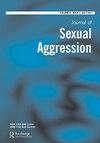Comparing distorted cognitions among university students and individuals convicted of sexual offences
IF 1.5
4区 社会学
Q2 CRIMINOLOGY & PENOLOGY
引用次数: 1
Abstract
ABSTRACT Very little contemporary research has investigated the similarities and differences between individuals convicted of sexual offences and community samples with reference to beliefs supportive of sexual violence. This study compared the rape supportive cognitions of a group of high-risk individuals incarcerated for sexual offences to a group of university students. Antisocial cognitions were also examined in order to determine if such views accounted for any observed findings. A group of 304 male university students were compared to 301 men convicted of sexual offences attending assessment or treatment in an inpatient based treatment programme. Results indicated no significant differences between the rape supportive cognitions and antisocial cognition of people convicted of sexual offences and university students. Further analyses revealed that students who endorsed more rape supportive and antisocial cognitions reported using more coercive and aggressive tactics. PRACTICE IMPACT STATEMENT This article will assist researchers and practitioners in designing strategies for prevention of sexual violence among university students by comparing students’ distorted cognition to individuals convicted of sexual offending and by shedding light on the association between distorted cognitions and perpetration of sexual violence.比较大学生与性犯罪者的扭曲认知
当代很少有研究调查性犯罪罪犯和社区样本在支持性暴力的信念方面的异同。这项研究比较了一组因性犯罪而被监禁的高危人群和一组大学生对强奸的支持认知。反社会认知也被检查,以确定这些观点是否解释了观察到的任何发现。一组304名男大学生与301名在住院治疗项目中接受评估或治疗的性犯罪者进行了比较。结果表明,性犯罪人的强奸支持认知和反社会认知与大学生无显著差异。进一步的分析表明,认同更多支持强奸和反社会认知的学生报告使用了更多的强制和攻击性策略。本文将通过比较学生的认知扭曲与被定罪的性侵犯者,以及揭示认知扭曲与性暴力行为之间的关系,帮助研究者和实践者设计预防大学生性暴力的策略。
本文章由计算机程序翻译,如有差异,请以英文原文为准。
求助全文
约1分钟内获得全文
求助全文

 求助内容:
求助内容: 应助结果提醒方式:
应助结果提醒方式:


